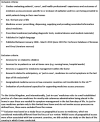Community access to palliative care medicines-patient and professional experience: systematic review and narrative synthesis
- PMID: 33775932
- PMCID: PMC11671949
- DOI: 10.1136/bmjspcare-2020-002761
Community access to palliative care medicines-patient and professional experience: systematic review and narrative synthesis
Abstract
Background: Providing palliative care patients living at home with timely access to medicines is critical to enable effective symptom management, minimise burden and reduce unplanned use of healthcare services. Little is known about how diverse community-based palliative care models influence medicine access.
Objective: To produce a critical overview of research on experiences and outcomes of medicine access in community-based palliative care models of service delivery through a systematic review and narrative synthesis.
Methods: MEDLINE, CINAHL, EMBASE, PsycINFO, Cochrane Library databases and grey literature were systematically searched for all types of studies. Study quality was assessed using the Mixed Methods Appraisal Tool; a narrative synthesis was used to integrate and summarise findings.
Results: 3331 articles were screened; 10 studies were included in the final sample. Studies included a focus on community pharmacy (n=4), hospice emergency medication kits (HEMKs) in the home (n=3), specialist community nurse prescribers (n=1), general practice (n=1) and one study included multiple service delivery components. Community pharmacy was characterised by access delays due to lack of availability of medicine stock and communication difficulties between the pharmacy and other healthcare professionals. HEMKs were perceived to reduce medicine access time out of hours and speed symptom control. However, the majority of studies comprised small, local samples, largely limited to self-reports of health professionals. There was a lack of data on outcomes, and no comparisons between service delivery models.
Conclusions: Further research is required to understand which models facilitate rapid and efficient access to medicines for community-based palliative care patients.
Keywords: home care; service evaluation; symptoms and symptom management.
© Author(s) (or their employer(s)) 2022. Re-use permitted under CC BY. Published by BMJ.
Conflict of interest statement
Competing interests: None declared.
Figures


Similar articles
-
Access to palliative care medicines in the community: An evaluation of practice and costs using case studies of service models in England.Int J Nurs Stud. 2022 Aug;132:104275. doi: 10.1016/j.ijnurstu.2022.104275. Epub 2022 Apr 29. Int J Nurs Stud. 2022. PMID: 35667146
-
Beyond the black stump: rapid reviews of health research issues affecting regional, rural and remote Australia.Med J Aust. 2020 Dec;213 Suppl 11:S3-S32.e1. doi: 10.5694/mja2.50881. Med J Aust. 2020. PMID: 33314144
-
Promoting and supporting self-management for adults living in the community with physical chronic illness: A systematic review of the effectiveness and meaningfulness of the patient-practitioner encounter.JBI Libr Syst Rev. 2009;7(13):492-582. doi: 10.11124/01938924-200907130-00001. JBI Libr Syst Rev. 2009. PMID: 27819974
-
Reducing unplanned hospital admissions from care homes: a systematic review.Health Soc Care Deliv Res. 2023 Oct;11(18):1-130. doi: 10.3310/KLPW6338. Health Soc Care Deliv Res. 2023. PMID: 37916580
-
The role and response of primary healthcare services in the delivery of palliative care in epidemics and pandemics: A rapid review to inform practice and service delivery during the COVID-19 pandemic.Palliat Med. 2020 Oct;34(9):1182-1192. doi: 10.1177/0269216320947623. Epub 2020 Jul 31. Palliat Med. 2020. PMID: 32736494 Free PMC article.
Cited by
-
Managing medicines at the end of life: a position paper for health policy and practice.J Health Organ Manag. 2021 Nov 18;35(9):368-377. doi: 10.1108/JHOM-11-2020-0440. J Health Organ Manag. 2021. PMID: 34841822 Free PMC article.
-
Preface: The Role of Pharmacists in Palliative and End of Life Care.Pharmacy (Basel). 2021 Aug 17;9(3):139. doi: 10.3390/pharmacy9030139. Pharmacy (Basel). 2021. PMID: 34449710 Free PMC article.
-
Issues affecting supply of palliative medicines into community pharmacy: A qualitative study of community pharmacist and pharmaceutical wholesaler/distributor perspectives.Explor Res Clin Soc Pharm. 2022 Apr 4;6:100132. doi: 10.1016/j.rcsop.2022.100132. eCollection 2022 Jun. Explor Res Clin Soc Pharm. 2022. PMID: 35909712 Free PMC article.
References
-
- National Institute for Health and Care Excellence . End of life care for adults (quality standard 13) London: NICE; 2011.
-
- Dawson S. Evaluation of nurse prescribing in a community palliative care team. Nurse Prescribing. 2013;11:246–9. doi: 10.12968/npre.2013.11.5.246. - DOI
LinkOut - more resources
Full Text Sources
Other Literature Sources
